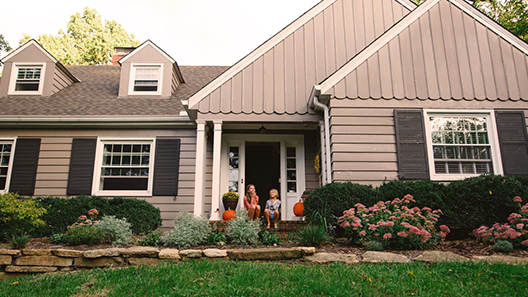For many Americans, a house is the biggest purchase they’ll make in their lifetime, and often their biggest investment. We’re seeing more first-time buyers enter the market, with 32% of buyers purchasing their first home in 2023.1
If you’re in the market to purchase your first home, it’s important to understand what to expect of the journey to homeownership and what is expected from you — we’re here to help! By considering all your options, you give yourself the space necessary to make the best decision for your financial goals.
Let’s discuss some common scenarios first-time buyers encounter and how to handle them.

What if I'm a first-time home buyer who…
…is concerned about putting 20% down?
Homeownership is a journey, and we all start somewhere. Contrary to what you may have heard, a 20% down payment is not a requirement to be approved for a mortgage. In fact, most first-time buyers have limited starting funds to work with so there are a number of programs and options that support your path to becoming a homeowner.
There are numerous assistance programs to look into. Finding the right program that matches your circumstances may take some research, but if it means making your homeownership goal a reality it could be well worth your time. And we’re here to help you guide you every step of the way through your home buying journey.
Some common options:
- Zero-down VA or USDA loans · FHA first-time homebuyer assistance programs
- Fannie Mae HomeReady® and Freddie Mac Home Possible® as little as 3% down
- Down payment assistance from state, local, or nonprofit agencies2
- Asking the seller to pay your closing costs (“seller contribution”)
- Receiving a down payment gift from a family member
- See if your lender offers any programs to assist with your closing costs
Usually, in the process of applying for a home loan you provide evidence proving that you have access to capital or cash to cover the closing costs and a down payment combined.
Lenders also like to know that you keep a little cushion in the case your income source suddenly dries up or you have an emergency expense — the more verifiable detail you can provide, the easier it is to be approved.
…may have less than perfect credit?
Your lender will look at one piece of information first no matter who you speak with: your credit score. You know the one. It’s that three-digit score assigned to you based on the likelihood that you will pay your bills (credit card, auto loans, home loans, personal loans) on time.
What to know about your credit score:
- The number can fluctuate by a few points depending on each of the three credit bureau’s reports.
- Your score can range from poor (300–579) to excellent (800–850).
- There’s no exact score that can guarantee you what you’re asking for — having a high credit score doesn’t promise better loan approval odds or interest rates, for instance.
Improving your credit score is always possible with the appropriate steps. While tactics vary, they often include paying down or off existing debts, closing unused accounts, and making payments on time.
…may be eligible for a grant?
Grants are unique in that they function like “gifts” when they aren’t added on as second mortgages by existing homeowners — this gifted money can be used towards whatever’s specified in your agreement (usually for down payment or closing costs). You’ll hear them compared to gifts because you aren’t asked to pay these back. Yay!
Common grant programs include:
- Community, employer, state, and local grants — many states have affordable housing programs that offer down payment assistance for first-time home buyers.
- The National Homebuyers Fund, which offers a percentage of payment assistance based on the loan amount for a down payment and/or closing costs.
…have self-employed income?
Freelancer. Independent Contractor. Entrepreneur. Consultant. While not the majority, for those of us whose main income is generated outside a typical 9–5 in the “gig economy”, it’s easy to feel discouraged when asked to prove how much you earn, and how consistently you earn it.
No sweat, though — you may need to prepare a more comprehensive presentation of your financial records, but you’ll be better positioned to secure funding. Keep this advice in mind:
- Be ready to put a larger amount down upfront. Lenders like to see borrowers contribute more than the minimum asked because it shows commitment to paying your home off early or on time. It also reduces the amount of money you need to borrow, bringing down your monthly payments.
- Work to boost your credit score. An increase in your credit score will have an immediate impact on how much home you can afford to finance and how willing a company to offer you a loan. After all, your credit score shows both your ability and history of paying your debts on time.
- Work independently for a few years ahead of qualifying. You are effectively your own business if you’re doing freelance work. Loan companies like to see that you have been working this way successfully for a while. Or better yet if what you earn has increased over time. Lenders may ask for two years of records, but three is advisable to show steady income and growth.
- Find a guarantor. Strengthen your buying power by adding a grantor or non-occupant co-borrower. If someone signs your loan with you to pick up the responsibility, should you not be able to pay your bills, you may possibly have an easier time securing funding as a first-time home buyer and potentially even borrow more



